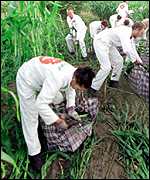| Home |
| Introduction |
| Need for Medicinal GMOs |
| Economics |
| Methods |
| Types of Medicinal GMOs |
| Ethical Issues |
| World Opinions |
| References |
Permission pending from |
Opinions |
Permission pending from |
____________________________________________________
While the use of GMOs may be extremely helpful to the human population, many people are still skeptical whether the benefits of genetically altered organisms outweigh the possible health risks. Recent polls throughout European countries have shown a high level of distrust for GMOs. From the major polls taken there seems to be a general trend toward creating a ban on GM foods (European GMO Campaign, 2004).
In December of 2001 a poll conducted by the European Commission showed that 85.9% of EU citizens wanted the right to choose whether they ate GM foods, while 70.9% did not want to eat foods that had been modified (European GMO Campaign, 2004). The majority of people still want to know if they are eating GM foods, while others simply want nothing to do with genetically modified food.
In spite of distrust for GM foods, seven million farmers in 18 countries planted GM crops on 167.2 million acres in 2003. This is up from 145 million acres in 2002 (Kulkarni, 2004). Countries such as India, whose GM planted area grew by 100%, along with China and South Africa, who increased their annual output of biotech crops by one-third, show that although most consumers have mixed emotions about eating GM foods, the farmers are finding biotech crops to be very ideal (Kulkarni, 2004).
In 2003, Brazil and South America joined the US, Argentina, Canada and China as the leading producers of GM crops. These five countries are responsible for 99% of GM crops grown in the past year (Kulkarni, 2004). While the debate will surely go on, it is note worthy that many leading scientists are giving their support to integration of GM crops, along with agreeing that biotech plants are a safe and effective means of improving the worlds agriculture problems (Kulkarni, 2004).
____________________________________________________
_____________________________________________________
This web page was produced as an assignment for an undergraduate course at Davidson College.
©Copyright 2004 Department of Biology, Davidson College,
Davidson, NC 28035
Send comments, questions, and suggestions to William Wood at wiwood(at)davidson.edu

